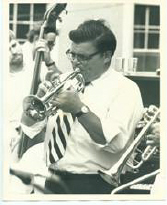WESTERN HIGH SCHOOL ALUMNI ASSOCIATION
William F. Whelan, ’47
Cornetist; Leader of ‘Dixie Six,’ other DC traditional jazz groups
The death of Wild Bill Whelan at age 76 on August 21, 2003 leaves a huge hole in the Washington DC jazz scene. Both as a cornetist and bass player, as well as vocalist, Bill energized any number of bands and audiences in this area (and elsewhere) for 50-odd years. His death was caused by a massive stroke; he already had been weakened by progressive kidney failure. As recently as a few months ago, he was trying — with great frustration — to renew his cornet chops and resume his front-line career. But it was not to be.
Here is a report by PRJC member (and high school classmate of Bill’s) Gary Wilkinson written in 1998. It tells the essential story.
“He can make candy. He can cook interesting Chinese food. He can fix ailing air conditioners, boats, and cars. He can, and does, at age 71, pilot a motorcycle, one of several he owns. He’s a very resourceful guy. But above all, he can play first-rate jazz and has since high school days. Wild Bill Whelan symbolizes what jazz is all about. He loves and understands it. He has a lifetime of musical leadership. And he has a deep commitment to playing the music right, whether on his cornet or his string bass.
Whelan has given to his listeners the notes and the drive that have captivated them for some 50 years. He never, never has just gone through the motions. He cares, and wants his audiences to care, too. He has never given less than his best. The legendary Wild Bill Davison, a musical icon who made jazz history and was a close friend and mentor to Whelan over several decades, knew musical integrity when he heard it. About Whelan: “He’s a wonderful player, isn’t he!” And about Whelan’s beloved Dixie Six, which he led for many years: “These guys know how to play music. You should be damn lucky with what you’ve got.” And so we have been, here in the Washington area, all this time.
The list of gigs Bill has played is endless. Thousands, upon thousands, many under his own name but all with the intensity that has been his hallmark. And he’s still going strong! Clubs, hotels, jazz festivals, resorts, universities, picnics, boat rides, charity jubilees, every conceivable venue. He has played on the Watergate stage at the foot of the Lincoln Memorial before an audience of 12,000. He played in Constitution Hall. Some popular local clubs, now gone, would include the Varsity Grill, Rustic Tavern, Brown Derby, French Quarter, Mr. Smith’s. He played at Blues Alley. He led a band at the Charles Hotel. And his Dixie Six was the mainstay for six glorious years at the Bayou in Georgetown — a club that can (and did!) seat some 450 persons.
In those Bayou days, Whelan was instrumental in bringing down from New York nearly two dozen of the most legendary men in jazz for Sunday afternoon sessions. Working with drummer George Wettling up in New York, he brought in Davison, Big Chief Russell Moore, Jimmy McPartland, Billy Butterfield, Tony Parenti, Bud Freeman, Phil Napoleon, Max Kaminsky, Cutty Cutshall, Don Ewell, Willie “The Lion” Smith, Buddy De Franco, Illinois Jacquet, Joe Venuti, Bobby Hackett, Ruby Braff, Coleman Hawkins, Roy Eldridge, Charlie Shavers — a Who’s Who of jazz immortals.
Bill has fronted many bands, including, in addition to the Dixie Six in various forms, his Bicentennial Jazz Band which, among many jobs, played a dinner dance honoring Senator Bob and Mrs. Dole, including a dozen ambassadors. And he’s played with other organized local groups over the years — Fat Cat’s Festival Jazzers, Docs of Dixieland, Washington Monumental Jazz Band, Shakey’s Pizza Band (later Southern Comfort), Gene Franklin’s Pier Five, Any Old Time Jazz Band, Band from Tin Pan Alley, and Greg Harrison groups. He played for more than a decade with the Happy Hicks (no kidding). So Bill always has been in demand.
Outside the area he’s played with the Bix Beiderbecke Memorial Jazz Band (New Jersey), Queen City (Denver), John Norris’s New Orleans Jazz Band (Honolulu), and Gene Mayl’s Dixieland Rhythm Kings (on the road). He was always welcomed in the Big Apple — he sat in often at Eddie Condon’s renowned nightclub and at one point was offered a two-year contract to replace Davison, who was going elsewhere. He played at Arthur’s Tavern, and other city spots, as well as many gigs in that general region, where he still appears!
With all this jazz activity, it’s a wonder how Whelan could earn a livelihood, but he did. He had a full career as a geodesist for the Army Map Service. He also found time to get married, and he and Peggy have three daughters and a son, and seven grandchildren.
Bill went to Western High School in Georgetown (now Duke Ellington School for the Arts) and that’s where he first struck a note for jazz. He went into the Army in 1945, played in two bands, led a 12-piece group and later he formed a band in England that played on weekends. After being discharged he found kindred jazz spirits back in Washington and soon had a group playing summers at Uncle Billy’s at North Beach, MD, on the Chesapeake Bay, where his mother had a cottage.
Then came his first days of glory and recognition at the Charles Hotel, a hotel that also drew white jazz fans. The Charles wasn’t large enough for the growing crowds and that’s when Bill ended up, after four years, at the Bayou, where the band’s fierce style drew multitudes of people over those great six years. Then a problem developed. Whelan took ill on the bandstand and doctors found a vascular situation he was born with and told him to not play for a couple of years. So he took up the banjo, and actually played some gigs with it. But then came the string bass, which quickly became his second musical home. But that wasn’t the end of Bill’s cornet career. His ability on both instruments propelled him to an even more active musical life, leading to at least 100 dates a year on one or the other.
Whelan anecdotes abound! Many involve Davison, his boon companion who came to the city frequently and lived in DC for a year. Some are not printable. Bill has always liked to have fun, and he has been good at it. Even back at Western his shenanigans drew attention. At the same time, however, his reputation as a giver also grew. He is a generous man, looks for ways to help others. His visits to very sick fellow musicians have combined humor with pathos, not an easy combination to attain, but deeply appreciated by the recipients.”
Gary Wilkinson ’47



